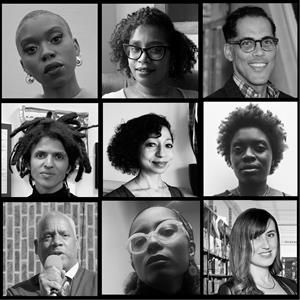What is the Black archive?
British Library, London.

What is the Black archive?
25 January 2024
10.00 - 18.00 (doors open 9.30)
Eliot Room, British Library Knowledge Centre
A day-long event considering archival silences and absences, do we need a more expansive vision of what the Black archive is or could be?
More information about What is the Black archive? tickets
What is the Black Archive? Inheritances and Interruptions Its goal is to strengthen connections within the field(s), share ideas, and challenge us all to think about the preservation and commemoration of Black British lives in these increasingly challenging times. 1. What is Black Studies post-2020? Is a uniquely British version of Black Studies possible or necessary? How resilient are the breakthroughs made in the wake of global Black Lives Matter protests? Does Black Studies belong in the academy? Refreshments & sandwich lunch provided JK Abuah Makella Ama Joan Anim-Addo Joanna Brown Kamara Dyer Simms Hannah Ishmael Anthony Joseph Halina Kaszycka-Williams Sundeep Lidher Malachi McIntosh Lola Olufemi Deirdre Osborne Matthew J. Smith Nydia A. Swaby Tony Warner A T Kabe Wilson Nicole Louise Wilson
Join us for a day of panel discussions examining What is the Black Archive? Run in partnership with Oxford University, this day-long event aims to interrogate how Black Britons have been remembered and to reflect on the past, present, and potential future for Black archives in Britain.
Curated by Malachi McIntosh and Kamara Dyer Simms in partnership with colleagues from the British Library and Eccles Institute for the Americas & Oceania, this inaugural event will unite artists, activists, scholars, writers, heritage professionals, and the general public to consider the what, where, and how of Black archives.
Featuring a mix of panels, presentations, and participatory roundtables, across the day the event will consider the following questions:
2. What was the Black Archive? How have we archived to date? What remains? What has been lost? How might we increase access to stories from our collective past?
3. What comes next for the Black Archive? How might we collectively build a vision for Black studies in 2025 and beyond? What do we do to preserve advances in the face of opposition?
Speakers include:
Josephina Kwando-Yaa (JK) Abuah is a North-West London-born Ghanaian multisensory artist, researcher, chef and landworker. Using food as a creative medium, Abuah seeks to facilitate accessible political education. JK’s anti-disciplinary work honours the palate, grief, seeds, hair and communion as historically viable forms of method.
Makella Ama is a Ghanaian Born, London-raised anti-disciplinary curator and filmmaker with a socially engaged practice. They recently co-curated and programmed Firelei Báez’s Sueño de la Madrugada (A Midnight’s Dream) exhibition at South London Gallery. A core value in Makella's work lays in demystifying the link between storytelling, history and the ability to bring archives to life/light/memory.
Joanna Brown is a writer and doctoral researcher at Royal Holloway, University of London. Rooted in the practice of creative writing in the archives, her PhD project, The Listening: Fictionalising Fugitive Voices and Fragmented Lives in the Slavery Archive, explores the limits, challenges and possibilities of writing life stories of Black women in Britain, enslaved and free, at the turn of the nineteenth century.
Kamara’s research into Black feminism regards epistemology and aesthetics on par with politicised somatics. Kamara has most recently served as the inaugural Black Studies Lead Curator at the British Library, engaging with collection material related to Black cultural heritage.
Sundeep is Lecturer in Black and Asian British History (post-1800) at King’s College London. She teaches modules on the politics of the archive and on Black London, the latter in partnership with the Black Cultural Archives. Following her work on Our Migration Story, Sundeep’s portfolio of public history work supports history curriculum reform in schools.
Malachi McIntosh writes fiction and literary criticism. His books are Parables, Fables, Nightmares (2023); Beyond Calypso: Re-reading Samuel Selvon (2016); and Emigration and Caribbean Literature (2015). He is at work on a book on the Caribbean Artists Movement.
Dr. Lola Olufemi is a black feminist writer and Stuart Hall foundation researcher from London who recently completed her doctorate based in the Centre for Research and Education in Art and Media at the University of Westminster. She is author of Feminism Interrupted: Disrupting Power (2020), Experiments in Imagining Otherwise (2021), and the forthcoming Against Literature (2026).
Deirdre Osborne PhD HonFRSL, FRSA is Emerita Professor of Literature and Drama in English (Goldsmiths). Co-founder of MA Black British Literature, (2015-24) her research spans late-Victorian to contemporary literature. Publications include: editor, Cambridge Companion to British Black and Asian Literature (1945-2010) (2016), co-author This is the Canon: Decolonise Your Bookshelf in Fifty Books (2021).
Matthew J. Smith is Professor of History and Director of the Centre for the Study of the Legacies of British Slavery at UCL. He is an acclaimed scholar of Caribbean History.
Nydia A. Swaby is a Black feminist artist-researcher, writer, and curator. Her practice engages archives, autoethnography, photography, the moving image and the imagination to explore the gendered, diasporic and affective dimensions of Black being and becoming. Her book, Amy Ashwood Garvey and the Future of Black Feminist Archives, was published in October 2024.
Tony Warner is the founder of Black History walks a 17 year old educational programme that supplies guided walks, talks and films on London's Black history. www.blackhistorywalks.co.uk
A T Kabe Wilson is an artist, performance poet and archival scholar whose work develops new modes of storytelling across different media. Noted for his contemporary adaptations of European modernism, he was the 2023 Artist in Residence at the Centre for Modernist Studies at the University of Sussex.
Dr Nicole Willson is a Leverhulme Trust Early Career Fellow within the Institute for Black Atlantic Research at the University of Central Lancashire. She is lead investigator of Fanm Rebèl: Excavating the Histories of Haiti’s Women Revolutionaries project and steers the digital humanities project www.fanmrebel.com
